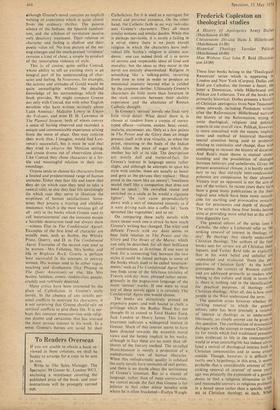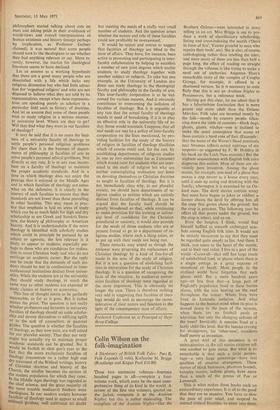Frederick Copleston on theological studies
A History of Apologetics Avery Dulles (Hutchinson £4.00) Historical Theology Jaroslav Pelikan (Hutchinson £4.00)
These four books belong to the 'Theological Resources' series which is appearing in London and New York (Corpus). Dulles and Reid are Catholics, the former a Jesuit, the latter a Dominican, while Hillerbrand and Pelikan are Lutherans. Two of the books are primarily historical. Dulles presents a history of Christian apologetics from New Testament times onwards, including Protestant writers after the Reformation. Hillerbrand narrates the history of the Reformation, trying In unite theological, religious and political aspects in one overall view. Pelikan, however, is more concerned with the nature, implica, 'ions and method of historical theology, special attention being paid to problems relating to continuity and change, than with attempting to recount the history of doctrine. And Reid's main theme is mutual under• standing and the possibilities of dialogue between believers and unbelievers. Given the present ecumenical climate, it is hardly neces• sary to say that old-style inter-confessional polemics are conspicuous by their absence. Victory over an opponent is not the aim 01 any of the writers. In recent years there have been a good many publications in the then' logical area which have been more remark• able for startling and provocative remarks than for preciseness and depth of thought. The series to which these four books belong aims at providing more solid but at the same time digestible fare.
The general editors of the series (one a Catholic, the other a Lutheran) refer to 'the striking renewal of interest in theology to' day'. By theology they clearly understand Christian theology. The authors of the four books sent for review are all Christian the"' logians; and Father Reid tells us explicitlY that in his work belief and unbelief are understood and evaluated 'from the per' spective of Christian faith'. As the books presuppose the context of Western culture and are addressed primarily to readers who belong to this culture and think in terms of it, there is nothing odd in the identification. for practical purposes. of theology With Christian theology. After all, this is how most people in the West understand the term.'
The question arises however whether the 'striking renewal' to which the general editors refer has been precisely a renewal of interest in theology as so understood. Obviously, no simple answer can be given to this question. The combination of ecumenical dialogue with the attempt to restate Christian- ity for minds which find traditional presenta: lions irrelevant to life in the contemporary world or even unintelligible has indeed stimn- lated a revival of theological interest both in , Christian communities and to some extent outside. Though, however, it is difficult 10 verify one's hypotheses in this area, it seems probable that a considerable amount of 'the striking renewal of interest' of some years ago was primarily the expression of a general desire to find a religious dimension in life and reasonable answers to religious problems in a broad sense rather than a specific inter. est in Christian theology as such. Whet
philosophers started talking about cats on mats and taking pride in their avoidance of world-views and overall interpretations of human existence and history (except perhaps by implication, as Professor Gellner claimed), it was natural that some people should turn to the theologians to see whether they had anything relevant to say. More re- cently, however, the market for theological literature seems to have declined.
Let us assume as a working hypothesis that there are a good many people who are dissatisfied with a life which lacks any religious dimension but who feel little attrac- tion for 'organised religion' and who are not disposed to believe what they are told by its representatives, except when these representa- tives are speaking purely as scholars in a particular field such as history of doctrine. And let us assume that some of these people wish to study religion in a serious manner, at university level. Where are they to go? Will they find what they want in our faculties of theology?
It may be said that it is no more the busi- ness of a university faculty of theology to settle people's personal religious problems for them than it is the business of depart- ments of philosophy in faculties of arts to solve people's personal ethical problems. Not directly at any rate, It is in any case incum- bent on a faculty of theology to maintain the proper academic standards. And in a time in which theology does not enjoy the prestige that it enjoyed in the Middle Ages and in which faculties of theology are some- what on the defensive, it is clearly in the interest of such faculties to ensure that their standards are not lower than those prevailing in other faculties. This may mean in prac- tice that emphasis is laid on areas of study which can be as much fields for high and dry scholarship as are Greek and Sanskrit litera- ture, the history of philosophy or American history. And it is understandable if the more theology is identified with scholarly studies which could in principle be pursued by an atheist or agnostic, the less relevant is it likely to appear to students, especially per- haps to those who are candidates for ordina- tion in some Christian body and who do not envisage an academic career. But the reply can be made that the demands of such stu- dents should be met in confessional or inter- confessional institutions distinct from univer- sities. While the students are at the university they should study theology in much the same way as other students are expected to study classics or history or economics.
This line of thought seems to be perfectly reasonable, as far as it goes. But it, rather misses the point. The question is not really whether professors and lecturers in university faculties of theology should set aside scholar- ship and devote themselves to edifying uplift or to • the task of counsellors or pastoral guides: The question is whether the faculties of theology, as they now exist, are well suited for our pluralist society. That they not only ought but actually try to maintain proper academic standards can be granted. But it would be foolish to shut fine's eyes to the fact that the more exclusively faculties of theology concentrate on a rather high and dry treatment of the Biblical writings, history of Christian doctrine and history of the Church, the smaller becomes the section of the student population for which they cater. In the Middle Ages theology was regarded as the chief science, and the great majority of the more notable mediaeval thinkers were theologians. In our modern society however faculties of theology tend to appear as small enclosed gardens, well cultivated no doubt but meeting the needs of a really very small number of students. And the question arises whether the nature and role of these faculties could not profitably be re-examined.
It would be unjust and untrue to suggest that faculties of theology are blind to the state of affairs. They have, for instance, been active in promoting and participating in inter- faculty collaboration by helping to establish a number of new joint degrees which enable students to study theology together with
another subject or subjects. To take but one example, in the University of London stu- dents can study theology in the theological faculty and philosophy in the faculty of arts. This inter-faculty cooperation is to be wel- comed for various reasons. And it obviously contributes to overcoming the isolation of faculties of theology. But it is arguable at any rate that the actual faculty of theology stands in need of broadening, if it is to play an effective role in the university life of to- day. Some would maintain, I suppose, that all real needs are met by a policy of inter-faculty cooperation on the lines mentioned, by pro- viding facilities for the study of the history of religion in faculties of theology (facilities which of course exist) and, for the rest, by establishing departments of religious studies in one or two universities (as at Lancaster) which would cater for students who are inter- ested in the study of religion but who are neither contemplating ordination nor keen on devoting themselves to Christian doctrine as taught in faculties of theology. But it is not immediately clear why, in our pluralist society, we should have departments of re- ligious studies as entities which are entirely distinct from faculties of theology. It can be argued that the faculty itself should be greatly broadened so that, while continuing to make provision for the training at univer- sity level of candidates for the Christian priesthood or ministry, it would also provide for the needs of those students who are at present forced to go to a department of re- ligious studies, where such a thing exists, or to put up with their needs not being met.
These remarks may sound as though the reviewer were proposing the replacement of Christian theology by a kind of free-for-all tussle in the area of the study of religion. But it is not a question of abolishing facil- ities in universities for the study of Christian theology. It is a question of recognising the facts of the situation. in mediaeval univer- sities faculties of theology were regarded as the most important. This is obviously no longer the case. There is therefore nothing very odd in suggesting that faculties of theo- logy would do well to encourage the recon- sideration of their nature and function in the light of the contemporary state of affairs.
Frederick Copleston SJ, is Principal of Hey, throe College







































 Previous page
Previous page